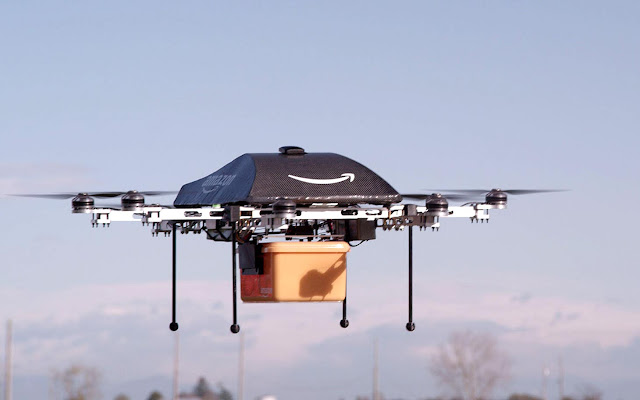More haste, less speed
Why brands should be cautious about the promise of drone deliveries.
Late last year Amazon showed off their latest innovation in drone technology, with an entire click-to-delivery transaction being completed in a mere 13 minutes.
You may have seen the video – a retired gentleman in Cambridge deciding he just must have an Amazon Fire TV stick and a bag of popcorn ….and he didn’t want to wait.
His click sent a fulfilment team into a frenzy at the nearby Amazon distribution centre and before we knew it, the customer was ambling out into his massive back garden to retrieve his package from the drone which had affected a perfect touch down on his conveniently located landing pad.
Minutes later, he was happily chomping away on the popcorn whilst trying to work out how to operate his new piece of technology.
Aha, you may say. All very well if you live on a country estate, near to an Amazon distribution centre, but what about those of us who live in urban areas?
Fear not, Amazon have thought of that too with their application for a patent to develop an Airborne Fulfilment Centre that would hover above major towns and cities from which selected high demand (and presumably light) products could be delivered with equal speed by a battalion of swooping drones.
All very impressive from a technology point of view, but apart from the huge costs, logistics and safety issues involved, one question does occur to me. Why?
Why go to all that cost and effort, just to ensure people get their deliveries that little bit quicker. Where will it all end?
Not so long ago, delivery inside a week was pretty standard and three days considered to be premium service. But that soon wasn’t quick enough as demand and competition meant that weeks became days and days became hours.
But are we any more satisfied? I’d suggest not. We have now come to expect to always have what we want, when we want it, without delay. And if we don’t get what we want, we are quick to complain. First world problems indeed.
Whatever happened to patience, to delayed gratification, to making short term sacrifices in return for longer term gains
Have such noble values been steamrollered by the relentless, always-on digital economy? Is there no way to temper the desire for immediacy?
In the marketing world this trend seems equally virulent with the emphasis having shifted so far towards real time reaction to data that there is less and less time for reflection, consideration, thinking and planning.
But as compelling evidence tells us, strong brands are generally the result of long term investment in brand building – thoughtful, intelligent, patient, brand building.
How can we square this off with the continual need for speed? How can we slow things down just a little? Or has that now become a forlorn hope?
When it becomes impossible to do things any quicker, then what?
Maybe all is not lost. For every trend, no matter how large and all-embracing, there is usually some form of counter-trend or backlash.
Last year in their annual report, Ofcom reported that 15 million people in the UK population had taken part in some form of digital detox, with 11% having done so in the past week.
And there are other examples that also point towards people being prepared to take things more slowly:
- Printed books have seen a reverse in years of sales declines
- Slow cooking has grown in popularity – both cookers and cookbooks
- Slow journalism has also emerged as a counter-balance to the 24/7 news cycle
More craftsmanship, care, quality & thought and less of a headlong rush into shaving time off an already ridiculously short timeframe.
Imagine a company proudly announcing a strategy that says “We won't get our products to you any quicker, but we will spend the time making them better”.
Brave? Yes. Foolhardy? Maybe. But what an empowering way for marketers to differentiate themselves positively and reassert some control over the supply chain.
Whilst part of me admires the ambition Amazon is showing with their drone strategy, another part of me hopes it becomes their equivalent of Google Glass – an innovative technology to address a non-existent need that will end up being quietly buried.
Whilst this would represent a setback for Amazon, I wonder if it might be good news for the rest of us in the long run.
A sign that quicker isn’t always better and that maybe there is still a benefit today in being patient and taking your time to get things right.




Comments
Post a Comment